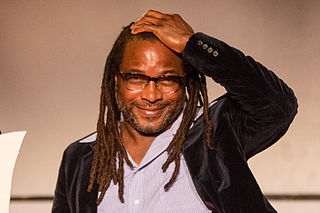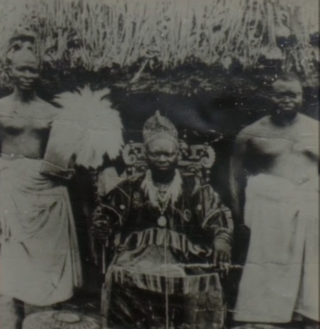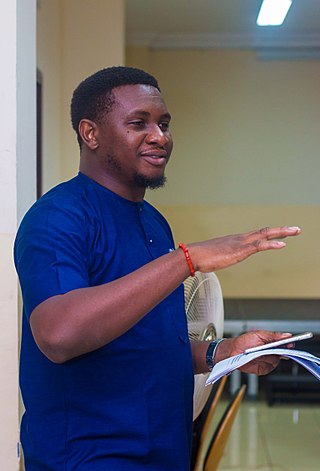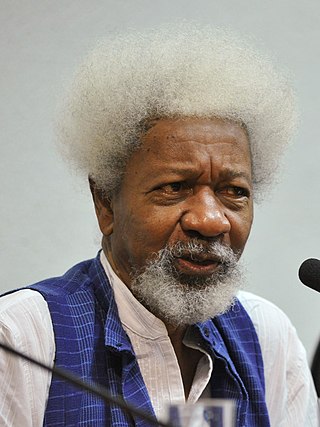
Akinwande Oluwole Babatunde Soyinka Hon. FRSL, known as Wole Soyinka, is a Nigerian playwright, novelist, poet, and essayist in the English language. He was awarded the 1986 Nobel Prize in Literature, for "in a wide cultural perspective and with poetic overtones fashioning the drama of existence", the first sub-Saharan African to be honoured in that category.
Death and the King's Horseman is a play by Wole Soyinka based on a real incident that took place in Nigeria during the colonial era: the horseman of a Yoruba King was prevented from committing ritual suicide by the colonial authorities. In addition to the intervention of the colonial authorities, Soyinka calls the horseman's own conviction toward suicide into question, posing a problem that throws off the community's balance.

Biyi Bandele was a Nigerian novelist, playwright and filmmaker. He was the author of several novels, beginning with The Man Who Came in From the Back of Beyond (1991), as well as writing stage plays, before turning his focus to filmmaking. His directorial debut was in 2013 with Half of a Yellow Sun, based on the 2006 novel of the same name by Chimamanda Ngozi Adichie.

Onyeka Nwelue is a Nigerian writer and filmmaker.
Wole Oguntokun a Nigerian playwright, dramaturge and director is the artistic director of Theatre Planet Studios and Renegade Theatre as well as a member of the board of Theaturtle, a Canadian theatre company. He is also a theatre administrator and newspaper columnist.
Wole Soyinka Prize for Literature in Africa is a pan-African writing prize awarded biennially to the best literary work produced by an African. It was established by the Lumina Foundation in 2005 in honour of Africa's first Nobel Laureate in Literature, Wole Soyinka, who presents the prize, which is chosen by an international jury of literary figures. Administered by the Lumina Foundation, the prize has been described as "the African equivalent of the Nobel Prize".

Kongi's Harvest is a 1965 play written by Wole Soyinka. It premiered in Dakar, Senegal, at the first Negro Arts Festival in April 1966. It was later adapted as a film of the same name, directed by the American Ossie Davis.
Chief Wale OgunyemiListen, OFR was a Nigerian veteran seasoned dramatist, film actor, prolific playwright, and Yoruba language scholar
Jimi SolankeListen is a Nigerian film actor, dramatist, folk singer, poet and playwright.
Olaokun Soyinka is a Nigerian medical doctor and a former Ogun State commissioner for Health.
Tunji OyelanaListen is a multi-award-winning Nigerian musician, actor, folk singer, composer and once a lecturer at the University of Ibadan, Nigeria. Tunji Oyelana is of the Yoruba ethnic group and is a native of Nigeria. Most of Tunji Oyelana's songs are in Yoruba. In the early 1980s, he teamed up with Nigeria's first and only winner of the Nobel Prize for Literature, Wole Soyinka, to record a musical album that satirized the corruption of the Nigerian political elite. He was the musician for Stéphane Breton's 1994 film Un dieu au bord de la route. Oyelana is credited with having sold the most albums by a Nigerian High Life musicians. In 2012 he released A Nigerian Retrospective 1966-79, an album from Soundway Records. Apart from Fela Kuti and King Sunny Ade, Oyelana is regarded as one of the most played Yoruba musicians. He and Soyinka composed I Love My Country and, in 1996, were both charged with treason and forced into exile by Sani Abacha while touring internationally with Soyinka's play The Beatification of Area Boy. Oyelana, the leader of The Benders currently lives in the United Kingdom.

Ademiluyi Ajagun was the 48th Ooni of Ife, a paramount traditional king of Ile-Ife, the ancestral home of the Yorubas. He was one of the most feared kings and was highly respected in Africa Official website around the world. He succeeded Ooni Adekola and was succeeded by Ooni Adesoji Aderemi.

Golden Age or Golden era are terms used in Nigerian film history to designate the motion picture industry of Nigeria from the late 1950s to the late 1980s. It captures the mode of visual and sound production, as well as the method of distribution employed during this period. This period began with the formal recognition of the Nigerian Film Unit as a sector in 1954, with the first film entirely copyrighted to this unit being Fincho (1957) by Sam Zebba.

Dami Àjàyí is a Nigerian poet, medical doctor, essayist and music critic. He co-founded Saraba magazine in 2008. He is the author of two collections of poetry and a chapbook.
Ripples Nigeria is a Nigerian online newspaper based in Lagos. It was launched in 2015. It is an independent, pro-investigation multi-media online news platform focused primarily on politics, policy and economy.
The Bacchae of Euripides: A Communion Rite is an adaptation by Wole Soyinka of the ancient Greek tragedy The Bacchae by Euripides.

Chronicles from the Land of the Happiest People on Earth is a 2021 novel by Nigerian writer Wole Soyinka. It is his third novel, and his first since Season of Anomy in 1973.
James Amuta is a film producer, director, aerial cinematographer and publicist. He is best known for his documentary film "Nightfall in Lagos" which was nominated for the best documentary film in 2018 by the Africa Magic Viewers' Choice Award.

The 1986 Nobel Prize in Literature was awarded to the Nigerian writer Wole Soyinka "who in a wide cultural perspective and with poetic overtones fashions the drama of existence." He is the first African recipient of the prize.
Elesin Oba, The King's Horseman is a 2022 Yoruba-language Nigerian historical drama film directed by Biyi Bandele and distributed by Netflix, based on Wole Soyinka'sDeath and the King's Horseman, a stage play he wrote while in Cambridge, where he was a fellow at Churchill College during his political exile from Nigeria, and it is based on a real incident that took place in Yorubaland during British Colonial rule. The film stars Odunlade Adekola as the titular character, with Shaffy Bello, Brymo, Deyemi Okanlawon, Omowunmi Dada, Jide Kosoko, Langley Kirkwood, Joke Silva amongst others in supporting roles.









